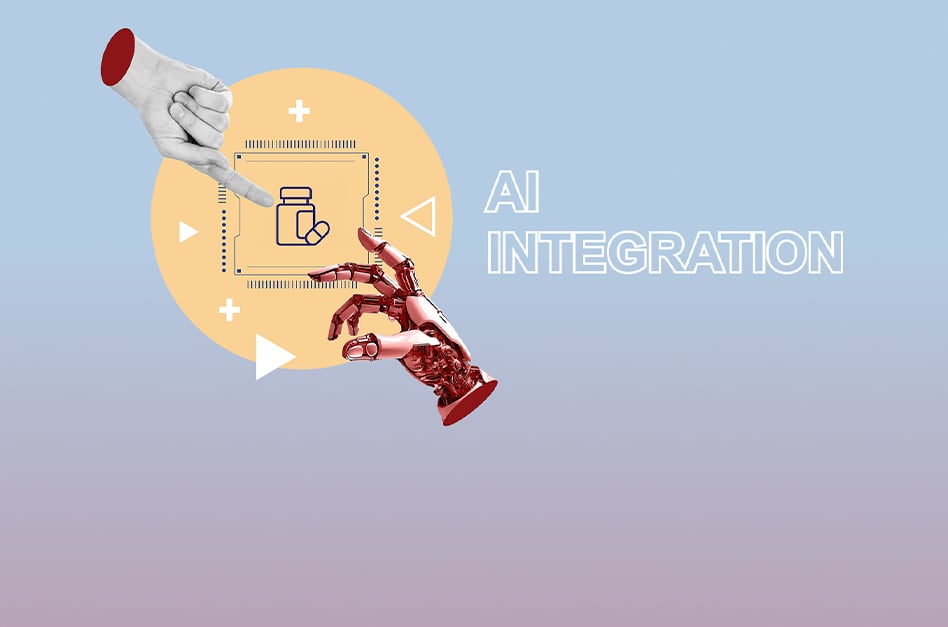AI Revolution: advantages and challenges of implementing a disruptive technology in pharma

AI is undoubtedly the most disruptive technological revolution of the latter years. Speed, customisation and security are the three main concepts in pharmaceutical manufacturing which AI can help improve. But while the potential is massive, the path to implementation is far from simple. Integrating AI into such a tightly regulated environment poses significant challenges, from data quality to operational transformations and ethical dilemmas. In this article we will uncover both sides of the issue and how the industry is managing them.

A new horizon,
of personalized medicine
The pharmaceutical industry is rapidly embracing the advantages that AI can bring to drug development and manufacturing. Instead of spending years on trial-and-error experimentation, researchers can now use AI predictive models to identify promising drug compounds in a fraction of the time, leading to a crucial acceleration in new drug development.
In the meantime, different algorithms are being trained on vast datasets consisting of patient data, to optimize trial design. By predicting how different people will react to therapies, AI enables a more targeted patient selection, even predicting trial outcomes more accurately.
Personalized medicine, a long-time goal of modern healthcare, is finally becoming a reality now that AI helps tailor therapies to individual patients by analyzing their genetic and clinical profiles, ensuring treatments are more effective and with fewer side effects.
The benefits are not limited to the patients, but extend to the manufacturing process of drugs. Machine learning models can monitor and adjust production processes in real-time, in order to provide consistent product quality while reducing errors and ensuring regulatory compliance.
As Fedegari, we carefully monitor and analyze trends concerning the production and safety of drugs. AI is being integrated into core pharmaceutical operations, from sourcing to quality assessment, pushing for a real transformation of the industry.
The challenges of data management and privacy regulations
As promising as AI looks, its integration into the pharmaceutical industry comes with great challenges, starting from data management. AI models require huge amounts of high-quality data to be trained, but oftentimes the available data is fragmented, unstructured or incomplete. Collecting, integrating and cleaning is an expensive and time-consuming process, which demands specialized data science skills that many organizations are still building.
Then there’s the cybersecurity matter. In an industry that deals with highly sensitive personal information, AI must be trained to respect strict data protection regulations because ensuring compliance with privacy laws and pharma regulations isn’t an option, but a prerequisite.

From sourcing to planning: integrating AI in pharma production
Starting from sourcing, AI is now able to optimize procurement processes by automatically generating RFPs and purchase orders, while also analyzing past negotiations to improve future contract management. This leads to faster and smarter decision-making across supply networks. Another great contribution to manufacturing comes from generative AI virtual assistants, able to locate relevant SOPs, generate checklists, monitor line performance and predict maintenance needs to avoid shutdowns.
AI is also improving quality management. By identifying patterns in deviations, classifying their severity, suggesting root causes and corrective actions, AI not only accelerates response times but ensures compliance through automatically generated reports.
Lastly, planning is also becoming smarter. AI tools can analyze historical data and trends, allowing companies to predict supply chain disruptions, optimize inventory and build real-time production plans, all resulting in a significant reduction in supply chain costs.

Key investments and strategic initiatives from industry leaders
To understand the true impact of AI in production processes we can refer to industry leaders like J&J, AstraZeneca, GSK as an example, investing heavily in AI for drug discovery, clinical trial optimization, and regulatory processes.
Another showcase of AI’s growing role in streamlining regulatory submissions and approvals by ensuring compliance with evolving guidelines. These companies are not just using technology to work faster, they are already rethinking the entire drug development process.

AI’s impact in numbers
The implementation of all these technologies has a measurable impact. The use of AI in production and quality management is expected to generate significant productivity improvements and cost savings.
Companies anticipate to see a 10-15% improvement in overall equipment effectiveness, a 30% increase in productivity for line leaders and a 35% boost in efficiency for quality investigations.
Inventory planning is also becoming 15% more accurate, reducing waste and improving delivery reliability, resulting in a 3% decline in supply chain costs.
Finally, it is predicted a 50% to 80% increase in productivity, depending on roles and categories.
The total economic impact of AI in the pharmaceutical value chain is massive, projected to generate from $60 billion to $110 billion annually.
AI is not just enhancing operations: it is redefining them with greater speed, precision and efficiency, generating concrete economic effects.
Reference: Generative AI in the pharmaceutical industry | McKinsey & Company
From exploration to adoption: the journey of AI in Fedegari
In Fedegari we explored the many possibilities offered by AI and embraced its potential by integrating it into key aspects of our daily operations. One of the most impactful applications has been in reviewing User Requirement Specifications (URSs). AI is used to pinpoint compliance issues and identify necessary deviations based on our extensive track record in the field.
This approach not only boosts our performance and accuracy but also significantly reduces response times for URS compliance.
Letting AI do the reviewing work, enables our SMEs to dedicate their valuable time to supporting customers, offering faster, proactive guidance and improving contract management efficiency.
